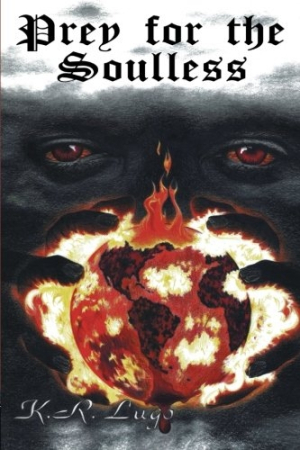Prey for the Soulless
The chilling atmosphere of this dystopian novel intrigues as it portrays the devil in human form.
Combining the savage death matches of the popular Hunger Games series with a story in which Satan assumes human form, K. R. Lugo’s Prey for the Soulless imagines a chilling dystopia where violence equals justice and humanity devolves into the barbarity of Roman times.
The devil, in the form of Marcus Powers, engineers bloody televised contests known as The Games, in which prisoners fight to the death using ancient weapons. As the bloodthirsty public cries out for increasing violence, Prey for the Soulless examines the viewpoints of fighters, Marcus, petty criminals, and a priest and his flock who want to stop the devil. The novel warns that society is headed toward depravity and offers hope in the existence of God. Lugo poignantly explores themes of human nature, the depth of evil, reality television, and religion in modern society while spinning a horrifying tale.
Marcus exudes a shivering air of menace even before readers learn he’s the devil. From the way his eyes bore into people to the way he intimidates others into obedience, one is immediately aware of his megalomaniac tendencies: “The soft drone of Marcus’s voice had an intoxicating effect … Hypnotized by his superior’s unflinching stare, Gordon felt the man’s will pierce through his own.” At first, Marcus appears to be a power-hungry bully, but Lugo skillfully ups the ante so that learning Marcus’s true identity becomes a pleasingly disgusting revelation instead of an outright shock.
As one would expect in a novel starring Satan, there are plenty of graphic descriptions of innovative ways he tortures and kills people. However, Marcus/Satan is the only consistently distinguishable character throughout the novel. There are so many players that it becomes difficult to distinguish one from another. The more interesting characters—such as a champion of The Games, Jason White, who suddenly turns religious, and Mary, a pious prosecutor in a justice system that routinely punishes prisoners by death—get short shrift when compared with the stories of various corrupt politicians, mobsters, and competitors. The small congregation, which is meant to fight Satan, emerges too late in the plot and does surprisingly little.
Despite the problems of the large cast, however, the audience will be left with something to chew on, as Lugo asks some tough questions about morals in modern society. The author does a marvelous job of integrating God into a book mainly about Satan. The apt use of biblical quotes at the start of every chapter is a reminder of the possibility of salvation and opens the door for the novel’s unexpected ending.
The ingenious pun in the title exhorts prayer for the characters who have lost themselves to bloodlust, while acknowledging they represent food for the soulless devil. With a black-faced, red-eyed demon clutching a flaming globe, the cover of this thought-provoking book may make readers fall prey to its message.
Reviewed by
Jill Allen
Disclosure: This article is not an endorsement, but a review. The publisher of this book provided free copies of the book and paid a small fee to have their book reviewed by a professional reviewer. Foreword Reviews and Clarion Reviews make no guarantee that the publisher will receive a positive review. Foreword Magazine, Inc. is disclosing this in accordance with the Federal Trade Commission’s 16 CFR, Part 255.

